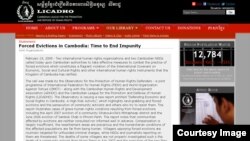A group of non-governmental organization leaders and researchers say the key to ending impunity in Cambodia is people’s full participation in politics and society.
“As long as the people wanting to change the status quo demand reforms in this country, I believe they will reach their goal, no matter how long it takes,” Ny Chakrya, monitoring head of rights group Adhoc, said at a national forum called “Ending Impunity in Cambodia,” held in Phnom Penh last week. “With the current leaders and their leadership style, I don’t believe there will be any reforms of the judiciary, because they just use court system as their political tool to suppress other groups or protesting communities.”
Critics say the rich and powerful or well-connected individuals rarely face justice, even though they commit crimes. In some cases, even if they are convicted for a crime, they never serve time in jail. Former Bavet governor Chhouk Bandit remains free, despite being sentenced for injuring three garment workers in a shooting in Svay Rieng province in 2012.
Preap Kol, executive director of Transparency International Cambodia, said such impunity leads to increased power abuse and corruption, and as a result people remain victims of social injustice.
“If wrongdoers never serve their sentences, as they can bribe the court or be protected by the powerful, then they will commit wrongdoing again,” he said. “People need to understand the problem and together demand for a change in the status quo, using their rights to choose leaders and mark their performances.”
Government spokesman Phay Siphan said the government has been strengthening the country’s legal framework in an effort to solve the impunity problem. “What they raise was just ill intended and only aimed at attacking [the government], not participating in ending impunity,” he said in an interview. “The government is open; if anyone has seen any individuals already convicted, they should cooperate with relevant authorities to bring them to serve their sentences.”
Social researcher Kem Ley, who focuses on impunity and corruption in Cambodia, said full social and political participation from the people is needed to put pressure on competing political camps to work to end impunity. “In political competition, similar forces will make reforms happen,” he said.
“With their power, the people must demand leaders of the state be accountable, so that they will prepare themselves to be their real servants,” said San Chey, country representative of Affiliated Network for Social Accountability-East Asia and the Pacific. “Justice for victims can't be ignored.”








